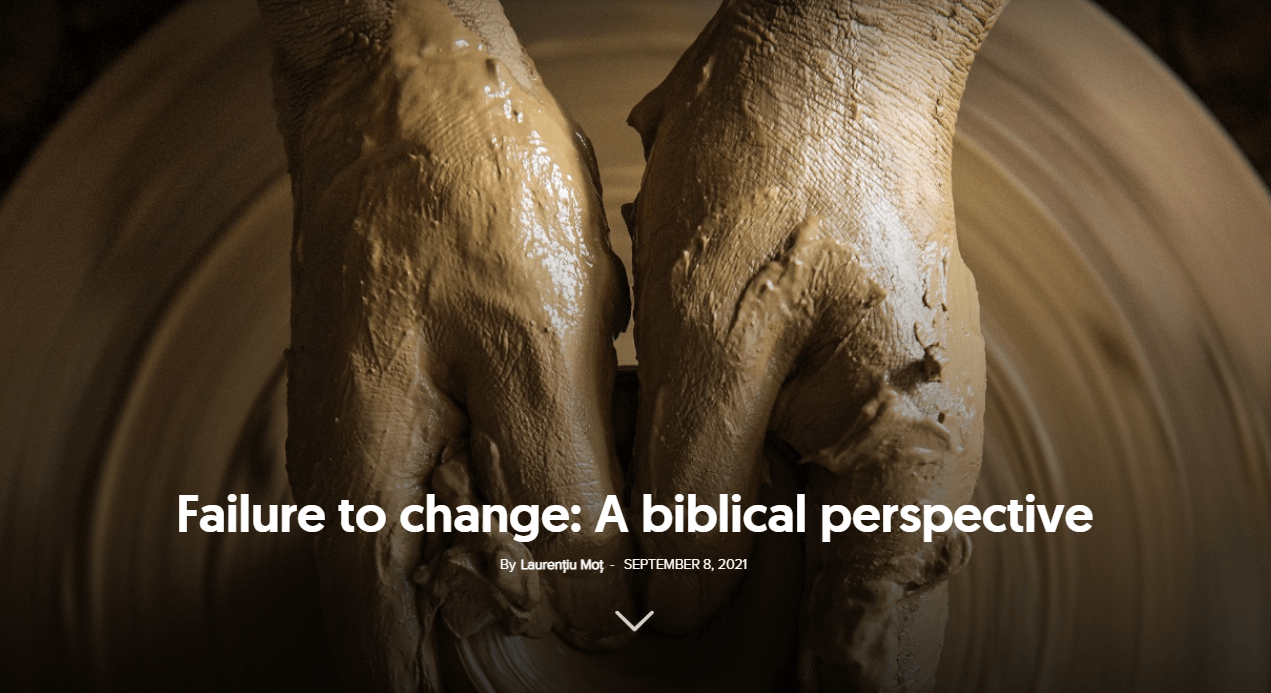Jesus replied, “Very truly I tell you, no one can see the kingdom of God unless they are born again” (John 3:3).
These words were addressed to Nicodemus, one of the Pharisees in the Bible who we regard with both respect and benevolence. Jesus was talking to him about a total change, as radical as the idea of a man literally being born again. The metaphor was not indecipherable, but Jesus’ radical tone gave Nicodemus the pretext for the question: How is this possible?
The echoes of the question have not yet died out, because there is no human on earth whose life experience is not on a collision course with the kind of change Jesus requires. We each have discovered so often how difficult it is for us to change even just a part of who we are. As for the idea of a change that leaves nothing as it was before—this confuses most of us. Therefore, “How is this possible?” remains the ever-present expression of our resistance to change and the strong emotions that accompany it, veering between amazement and indignation.
The biography of a radical change
In the New Testament (NT), the most influential follower of Jesus who went through such a radical change is without a doubt the apostle Paul. His conversion is described in the most detailed, and the most frequently mentioned, account in the NT text. A distinguished scholar, an exponent of the Jewish separatist movement, and a legalist zealously persecuting Christians, he became an apostle of all nations, a preacher of God’s grace and reconciliation, and a pacifistic missionary.
None of the NT authors exposed their thoughts about their life after their conversion in the way Paul did. He recognizes himself as “the worst”[1] of sinners, who wants to do good, but finds that evil clings to him.[2] When he extends the analysis, Paul concludes: “…there is no one who does good, not even one” (Romans 3:12). However, no one insisted, among all the NT authors, more than Paul on the possibility and reality of changing the sinful human: “For all have sinned… and all are justified freely by his grace through the redemption that came by Christ Jesus” (Romans 3:23-24).
Was Paul merely a proponent of a pessimistic anthropological view? Was the total dependence on God he preached about only a solution imagined by a perfectionist discouraged by his own failures? Paul’s life does not support such a conclusion. Not only was this leading Pharisee not disappointed, but he was very pleased with himself, his religion, and his nation.[3] Moreover, he was intensely concerned with preserving the purity of Israel, not only because it was part of his identity, but because he took pride in them.
His dramatic conversion on the road to Damascus was a completely unforeseen, cataclysmic event in Paul’s life, with completely unexpected results. The reset of his mentality, orientation, beliefs, and convictions, which occurred in that close encounter with the Lord,[4] are absolutely remarkable. The former top executive of the Sanhedrin started to see life in completely new ways, in relation to everything he had previously learned and sought after.
Paul, who had no reason, from a human perspective, to desire or choose such a change, becomes a representative of the metanoia,[5] of radical change, both as a moment of conversion and as the process of a lifetime.
His change perfectly illustrates the concept used by Jesus: Paul was born again. Or, according to his shocking idea expressed in writing later: a fool had just been born.[6]
The fool whose eyes were opened
On the road to Damascus, Paul temporarily went blind.[7] However, from that moment on, as he would claim for the rest of his life, his eyes were opened. He later confessed to the Christians in Philippi: “But whatever were gains to me I now consider loss…because of the surpassing worth of knowing Christ Jesus my Lord, for whose sake I have lost all things. I consider them garbage, that I may gain Christ” (Philippians 3:7-8).
With this newly acquired spiritual discernment, Paul began his mission during which he established, pastored, and counselled a multitude of churches, either personally or through the epistles that make up much of the New Testament today. In them we find a summary of his beliefs about human vulnerability and our need for change and salvation.
Sarx is the Greek word that Paul uses to describe what is wrong with us. In essence, the sarx (translated in 1 Corinthians 15:50 as “flesh”) cannot inherit the Kingdom of God. Our flesh is an indication of weakness, of inevitable vulnerability, which has characterized us since we were born into this part of the universe. We are not only subject to weakness and mortality, but we are implicitly slaves to the anxiety and discouragement that derives from understanding our terrible fragility.
Sarx does not mean flesh in the physical sense for Paul, so it does not refer to our body, for which the apostle uses the word soma. With the word sarx, Paul describes our earthly nature, that is, the soil in which the corruption of the human soul and its revolt against God and redemptive change are growing.[8] The exhortations of our flesh, he explains, are in absolute antithesis to the Christian life,[9] and we are, unfortunately, prisoners of “this body that is subject to death” as Paul calls it in his epistle to the Christians in Rome (Romans 6:6, cf. 7:24).
Locked in
On December 29, 1995, Jean-Dominique Bauby was recovering from a 20-day-long coma following a massive stroke. He opened his left eye—this was the only move he was able to make until the end of his life. Jean-Dominique was completely paralyzed, unable to move any muscle from the top to the bottom of his body, except those muscles that activated his left eye. His right eye had to be sewn up. The diagnosis he received was a grim metaphor for a meaningless existence: locked-in syndrome.
We are locked in. This is exactly what is happening to us, says the apostle Paul. We are captives of our own flesh. Its weakness has become our source of suffering. We cannot separate or distance ourselves from it, because “the flesh cannot be separated from the person, just as neither the mind nor the body can be separated from the person.”[10]
“Out of darkness into his wonderful light” (1 Peter 2:9)
However, Jean-Dominique Bauby found a way out of the perfect prison. He described it to us in the book The Diving Bell and the Butterfly,[11] in which we discover him free and happy, together with his loved ones. Bauby conveyed his message letter by letter. His therapist read the alphabet repeatedly, so that Bauby could choose, by blinking, the next letter to add to the book. He died shortly after finishing his book.
In reality, like Bauby, we all live in permanent helplessness. However, this limited and limiting life, which is subject to continual frustration and temptation, is not an inescapable prison. It is an unhealthy, cold, and dark dungeon, from which we can still look beyond the outbreaks of infection and the fatalism of our existence. This hope is offered to us so fully and at the same time so intimately, Paul believes, that, in order to describe it faithfully, he uses the metaphor of habitation.
Our salvation from ourselves, from the nature that predestines us to death, begins from within us, through Christ dwelling in us. It is an encounter between the highest level of lack and impotence, and the highest level of presence and power.[12] This is where change begins. But what is change? What do we leave behind and how, and what do we become after the change?
Change‒surgery or transformation?
Our nature is fatally infected, and rendered incapable of living up to the standards of divine purity. However, the true culprit is neither the law nor the self, but sin.[13] Our flesh is the result of the direct action of sin on the fallen human. Sin can no longer be removed from our being so that what is left is something good, functional, and according to God’s original intention. Sin has metamorphosed and merged with the very essence of our being.
Our salvation involves not only a separation from sin, but also the transformation of what remains after the removal of sin.
Only through the creative restoration that God carries out within us will we be able to return to the initial stage of creation. Until that moment of total restoration, the Christian is forced to live a paradox, expressed by the apostle Paul in the following words: “I myself in my mind am a slave to God’s law, but in my sinful nature a slave to the law of sin” (Romans 7:25).
This duality arises from the fact that “the flesh desires what is contrary to the Spirit” (Galatians 5:17). In their flesh, humans rebel against the One who created them and simultaneously act against their own best interests.
The flesh carries a degenerative autoimmune disease, and the mortality rate is 100 percent.
According to the Bible, however, the biggest problem is not the disease itself or the lack of treatment, but the addiction generated by living according to the urges of the flesh—an addiction that causes humans to feel that they have no problem and that they are living life to its fullest. People thus come to put their trust in their altered senses, which become landmarks for their moral evaluations of life, to the detriment of the standard of God’s character.
“You are depending on… that splintered reed of a staff” (Isaiah 36:6).
The flesh has rendered us incapable of distinguishing what is pure from what is defiled. However, we have started to believe that adherence to certain value systems, built on education and discipline, is enough to pass any moral test. Jesus’ compatriots felt safe by joining the covenant community, through circumcision.
Boundaries were clearly drawn between the saved and the lost, not on the basis of an inner, deep, and total transformation of individuals, but based on the instrumentalization of Old Testament traditions—circumcision, the covenant, the promise, and so on. Even today, people who are vulnerable to sin consider themselves immune to it by adhering to an exact system of values, principles, rules, and standards.
However, our conscientious adherence to a moral code, whatever it may be, and a system of rules and standards, cannot be equated with the radical change that Jesus spoke about with Nicodemus. As noble and virtuous as it may seem, obedience to laws cannot make us acceptable to the God of the Bible. The law cannot be a tool for salvation, because we cannot save ourselves, regardless of the means we have at our disposal. To save ourselves from the inherent corruption of our nature we do not need an instrument, but a Saviour. We cannot save ourselves, we can only be saved.
We are intrinsically incapable of living in full harmony with God’s eternal law (Romans 8:8). If God’s law is the supreme expression of His character and the basis of His government, the human in whom the reflection of God’s character is not found cannot be accepted by God. That is why, without an outside intervention, we will not be able to overcome our fatal weaknesses, no matter how much we trust in disciplining and cultivating our virtues. We can “put no confidence in the flesh” (Philippians 3:3). What is left for us is to trust in the radical change that Jesus was talking about and in the One who carries out this transformation in us.
Born again, by choice
There is no safe place on earth for the one who wants to get rid of sin and its effects. The only source of security is outside our world and consists of a union between the divine and the human. Christ dwelling in the human, through the Holy Spirit, as the only way of salvation, speaks of the inefficiency of any human initiative and of our need to surrender ourselves entirely into God’s hands.
Although it seems crazy to anyone who lives according to the urges of the flesh, this is the only real escape. “Then you will know the truth, and the truth will set you free” (John 8:32). In other words, God asks us to accept what, right now, might look like enslavement—a total surrender into His hands, a complete dependence on His will[14]—so that, later, after sin has been removed and our nature is restored to the model of God’s creation, we can discover that we wouldn’t have really wanted to live differently, and that this is the true freedom for which we were created.
In the end, we find that this is the same old choice we make by faith. By doing so, we can come to God with the candour of the father who asked Jesus to heal his son:
“I do believe; help me overcome my unbelief!” (Mark 9:24). The paradox of this well-received request captures how God deals with us in the process of change: “…my power is made perfect in weakness” (2 Corinthians 12:9).
God is looking for us. He gives us His solution to our problems. He offers us salvation, but waits for our decision to receive it.
No one receives God’s saving grace unintentionally or unknowingly
The person who begins to live a new life, through God, does so by consciously choosing to accept God’s call and the clean garment He has prepared for those who are called.[15] Then He walks with us on the difficult path, without treating us with the intransigence of a coach who expects nothing less than first place.
His image, instead, is that of the eternal parent who never forgets his parental instinct, care, understanding, and desire to be helpful, to support His children on the path of growth and development. That is why His power works so well in our weakness, that is why He is so understanding of the paradoxes of our faith. Because He “knows what we are made of”[16] and because He “does not tire of forgiving.”[17]
King David gives us the quintessence of this saving relationship in the lyrics of one of his psalms, which exudes a spirit of hope just as strongly as the first ray of sunshine boldly and surely announces the end of the night: “I waited patiently for the Lord; he turned to me and heard my cry. He lifted me out of the slimy pit, out of the mud and mire; he set my feet on a rock and gave me a firm place to stand” (Psalm 40:1-2).
You may also like:
Norel Iacob dwells on some of the great existential questions: “What is wrong with the human being and why?”, “How can we be saved from our infirmities?” The answers he has found shows that these themes are very important to the authors of the Bible.




















